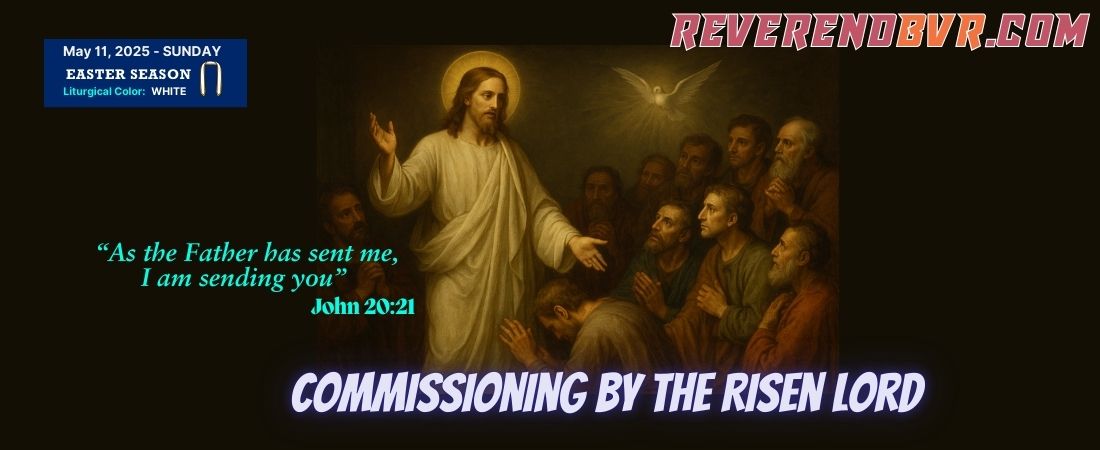Sermon Topic: Commissioning by the Risen Lord | “As the Father has sent me, I am sending you” (John 20:21).
Date: May 11, 2025, Sunday.
Scripture Readings: Jeremiah 9:1–10; Psalm 47; 1 Timothy 4:6–16; John 20:19–23
Original Language Reflections (For deeper study, see Section 10 in the sermon): Refer Table explaining Hebrew & Greek Words.
Website: www.reverendbvr.com
Introduction: The Divine Mandate from the Risen Christ
In the stillness of the upper room, hidden behind locked doors and clouded by fear, the disciples encountered the resurrected Christ (John 20:19). What He offers them is not merely peace or comfort, but a commission—a divine mandate echoing the very heartbeat of God’s redemptive plan through history. “As the Father has sent me, I am sending you” (John 20:21). These words stand at the threshold of the Church’s mission, marking the transition from fear to fearless witness.
This post-resurrection commissioning is not an isolated incident, but the culmination of a biblical tradition of sending, instructing, and entrusting God’s chosen for divine purposes. From the prophets of old to the early apostles, from Timothy to today’s believers, this commissioning is both a privilege and a responsibility.
1. Commissioning Amid a Broken World (Jeremiah 9:1–10)
The lament of Jeremiah unveils a world deeply fractured by deceit, betrayal, and spiritual decay. His cry—“Oh, that my head were a spring of water” (Jer. 9:1)—is a prophetic intercession, a weeping that mirrors the sorrow of God over His people’s rebellion. The Hebrew expression here, מְקוֹר מַיִם (mĕqôr mayim), meaning “a spring of water,” symbolizes unending grief and heartfelt lamentation.
This background is crucial. The commissioning of the Church does not occur in a utopia, but in a world akin to Jeremiah’s—steeped in falsehood and injustice. The need for truth, reconciliation, and divine intervention remains as urgent now as it was then. As Christ was sent into such a world, so too are we—commissioned not to escape the world’s brokenness, but to be redemptive agents within it.
2. Commissioning for Christ-like Character (1 Timothy 4:6–16)
St. Paul’s instruction to Timothy frames Christian leadership not merely as proclamation but as personification. The Greek term τύπος (typos), meaning example or model, is at the heart of verse 12: “Set an example for the believers in speech, in conduct, in love, in faith and in purity.”
This is a form of commissioning not based on eloquence or seniority, but on the transformative power of a godly life. Timothy, young and perhaps underestimated, is exhorted to live a life that embodies the gospel—becoming a living epistle (cf. 2 Cor. 3:3), readable by all. This is both inspirational and sobering: the credibility of our message is intimately tied to the integrity of our lives.
Here, we see that commissioning entails not only what we preach but how we live. Holiness, diligence, and doctrinal fidelity are the spiritual hallmarks of those truly sent by Christ.
3. Commissioning with Authority and Power (John 20:19–23)
John’s Gospel provides a profound theological moment: the risen Christ breathes on His disciples and says, “Receive the Holy Spirit” (John 20:22). The Greek term ἐμφυσάω (emphusao), used here for “breathed,” occurs only here in the New Testament but recalls Genesis 2:7 in the Septuagint, where God breathes life into Adam. This is new creation language. Christ, the second Adam (1 Cor. 15:45), is recreating His followers for a new mission.
This divine breathing is both symbolic and sacramental—it is the empowerment of the Church through the Spirit for the forgiveness and transformation of the world. “If you forgive anyone’s sins, their sins are forgiven” (John 20:23) speaks not of arbitrary judgment but of sacramental participation in God’s redemptive work. The Church becomes a vessel of reconciliation, echoing the ministry of Christ Himself (2 Cor. 5:18–20).
This commissioning is grounded in divine peace (εἰρήνη, eirēnē), divine mission (πέμπω, pempō – “to send”), and divine empowerment through the Spirit (πνεῦμα ἅγιον, pneuma hagion).
4. Commissioning to Proclaim and Rule with Joy (Psalm 47)
Psalm 47 bursts forth in royal celebration: “Clap your hands, all you nations; shout to God with cries of joy” (v.1). God is portrayed not merely as Israel’s King, but as “King over all the earth” (v.7). This universal kingship is the basis for the Church’s mission. The Hebrew word מֶלֶךְ (melek), meaning “king,” connects to the Gospel image of Christ as enthroned Lord, commissioning His people to proclaim His reign.
The Psalm reminds us that our commissioning is not burdened with anxiety but carried out in joy and confidence, knowing that God reigns. The mission is not our own—it is God’s, and we are heralds of His sovereign grace.
5. Conclusion: The Commission Continues
From Jeremiah’s tears to Timothy’s calling, from the upper room to the ends of the earth, the narrative of Scripture is one of sending, of mission, of commissioning by the Risen Lord. This is not a past event but a living reality. The Church, every believer, is summoned to embody Christ’s presence in a fragmented world—to be sent as He was sent, with the message and ministry of reconciliation.
In a world overwhelmed by division, fear, and deception, may we live lives that reveal Christ. May we preach, teach, forgive, and serve with boldness and humility. The Risen Christ says even now, “As the Father has sent me, I am sending you.”
6. Commissioning Myths vs. Biblical Discipleship – What It Really Means to Be Sent :
| 1 | Discipleship is about religious consumption | Make Disciples, Not Consumers | Discipleship is about transformation through learning and apprenticeship, not spiritual consumerism. | Matthew 28:19 – “Make disciples of all nations” |
| 2 | Mission is about comfort and success | Commissioning Is Costly | True mission requires sacrifice and suffering, just as Christ’s mission did. | Matthew 10:16 – “Sheep among wolves” |
| 3 | Mission is just about preaching or words | Evangelism-Only Focus | Proclamation is incomplete without discipling, spiritual formation, and intentional living. | Matthew 28:19–20 |
| 4 | Mission is an individual effort | The Commission Continues | The call to mission is communal—each believer shares in the ongoing mission, not just a select few. | John 20:21 – “As the Father has sent me, I am sending you” |
| 5 | Mission is about power and control | Commission is Not Control | Commissioning in Christ’s name is rooted in humble service, not domination or control. | John 20:21; Philippians 2:6–8 |
| 6 | Mission is just about activities or programs | Busyness over Sentness | True mission is a Spirit-led, intentional witness, not mere church activity or busy schedules. | Acts 1:8; John 20:22 |
| 7 | Mission is optional for some Christians | Mission as Optional | Every believer is called to the mission; it’s the identity of the Church, not just a role for the clergy. | 1 Peter 2:9; John 20:21–23 |
| 8 | Mission is about personal success or image | Branding Replacing Witness | Mission is about embodying Christ’s love and presence, not focusing on church image or platforms. | John 1:14; 1 Corinthians 2:1–5 |
| 9 | Mission only concerns personal salvation | Neglecting the Global & Marginalized | Biblical mission includes justice for the poor and marginalized, addressing social and economic needs. | Luke 4:18–19; Matthew 25:35–40 |
| 10 | Mission can happen without the Holy Spirit | Forgetting the Holy Spirit | Without the Spirit’s empowerment, mission is powerless; the Spirit enables and breathes life into our mission. | John 20:22; Acts 2:1–4 |
7. Closing Prayer
Risen Lord, who came to your disciples with words of peace and breathed upon them the Spirit of God, breathe on us now. Rekindle within us the flame of your calling. Where there is fear, grant courage. Where there is weariness, give strength. Where there is doubt, restore faith. Commission us again to be your people, sent to forgive, to love, to teach, and to proclaim your reign. Let us bear your wounds with humility and carry your name with honor, until the whole world knows the joy of your salvation. In your powerful name we pray, Amen.
8. Summary Table: Commissioning by the Risen Lord
| S. No | Theme | Text | Key Concept | Theological Insight |
| 1 | Broken World | Jeremiah 9:1–10 | Prophetic lament | The call arises amid moral and social collapse |
| 2 | Christ-like Character | 1 Timothy 4:6–16 | Lifestyle as witness | Godliness authenticates ministry |
| 3 | Spirit-Empowered Authority | John 20:19–23 | Holy Spirit & forgiveness | Commissioning as new creation and missional empowerment |
| 4 | Joyful Proclamation | Psalm 47 | Global kingship of God | Mission flows from divine sovereignty and joy |
9. Bibliography
- Brueggemann, Walter. The Prophetic Imagination. Fortress Press, 1978.
- Wright, N.T. Surprised by Hope. HarperOne, 2008.
- Keener, Craig S. The Gospel of John: A Commentary. Baker Academic, 2003.
- Marshall, I. Howard. The Pastoral Epistles. T&T Clark, 1999.
- Wright, Christopher J.H. The Mission of God: Unlocking the Bible’s Grand Narrative. Downers Grove: IVP Academic, 2006.
- Bosch, David. Transforming Mission: Paradigm Shifts in Theology of Mission. Maryknoll: Orbis Books, 1991.
- Newbigin, Lesslie. The Open Secret: An Introduction to the Theology of Mission. Grand Rapids: Eerdmans, 1995.
- Bruce, F.F. The Acts of the Apostles. Grand Rapids: Eerdmans, 1990.
10. Learn Words from the Original Scriptures (For deeper understanding and meditation on today’s theme)
| S.No | Language | Term – Click on each term to view its lexical details | English Meaning |
| 1 | Hebrew | מְקוֹר מַיִם (mĕqôr mayim) two words –> a. מְקוֹר (meqor ) Spring, b. מַיִם (mayim) water | “spring of water” |
| 2 | Hebrew | מֶלֶךְ (melek) | “king” |
| 3 | Greek | τύπος (typos) | “example, model” |
| 4 | Greek | ἐμφυσάω (emphusaō) | “breathed” |
| 5 | Greek | εἰρήνη (eirēnē) | “peace” |
| 6 | Greek | πέμπω (pempō) | “to send” |
| 7 | Greek | πνεῦμα ἅγιον (pneuma hagion) two words –> a. πνεῦμα (pneuma) spirit, b. ἅγιον (hagion) Holy | “Holy Spirit” |
| 8 | Hebrew | הִנֵּה (hinneh) | “Behold” |
For more sermons and biblical reflections, visit:
🌐 www.reverendbvr.com/sermons

